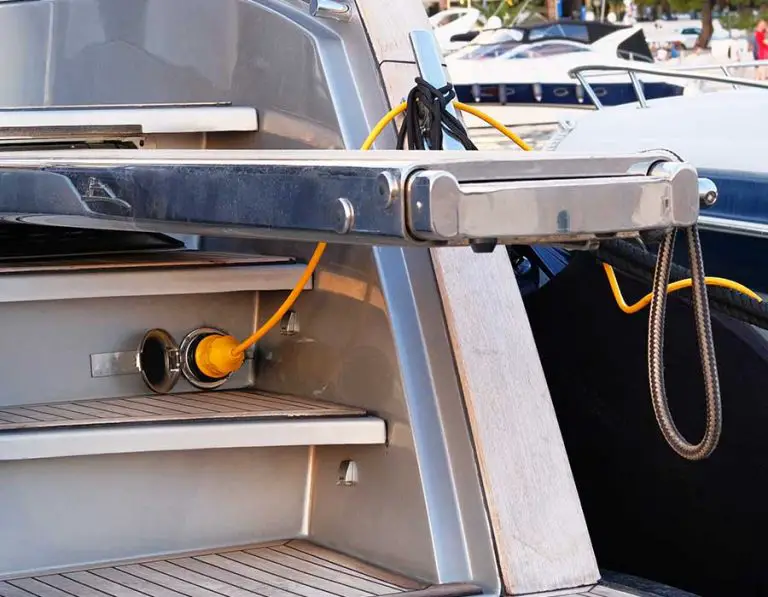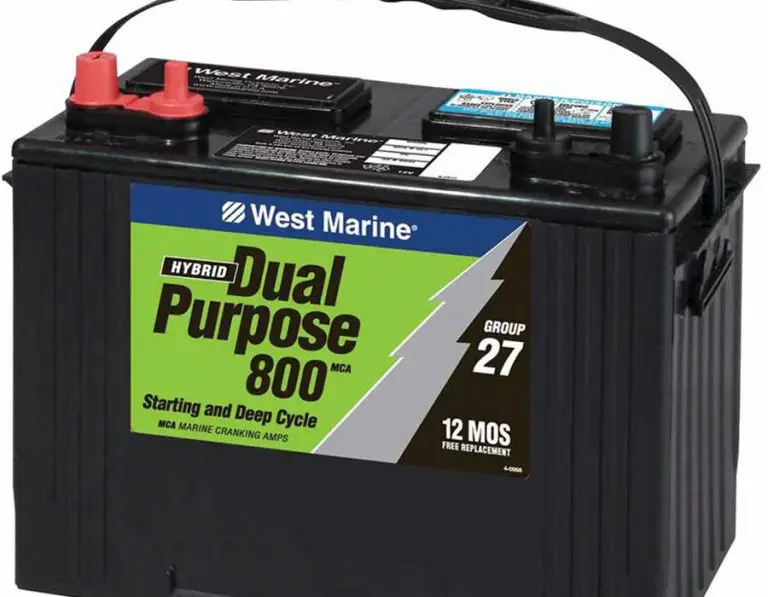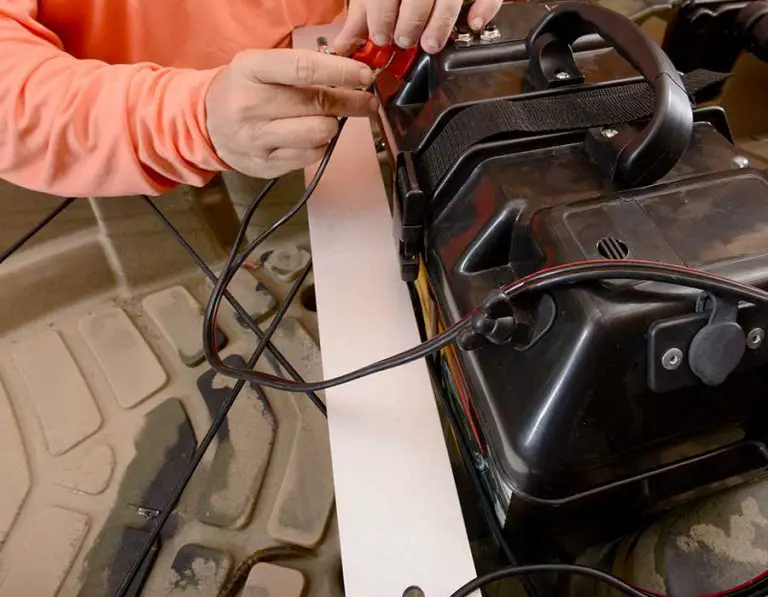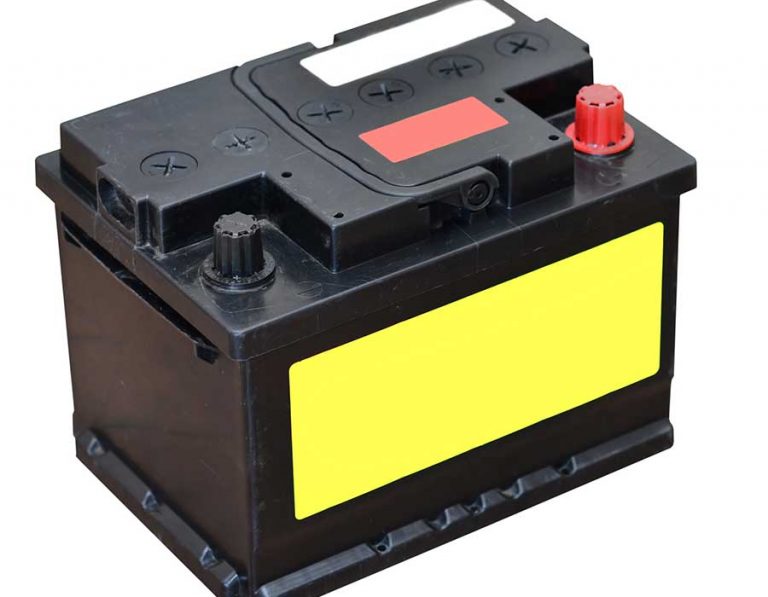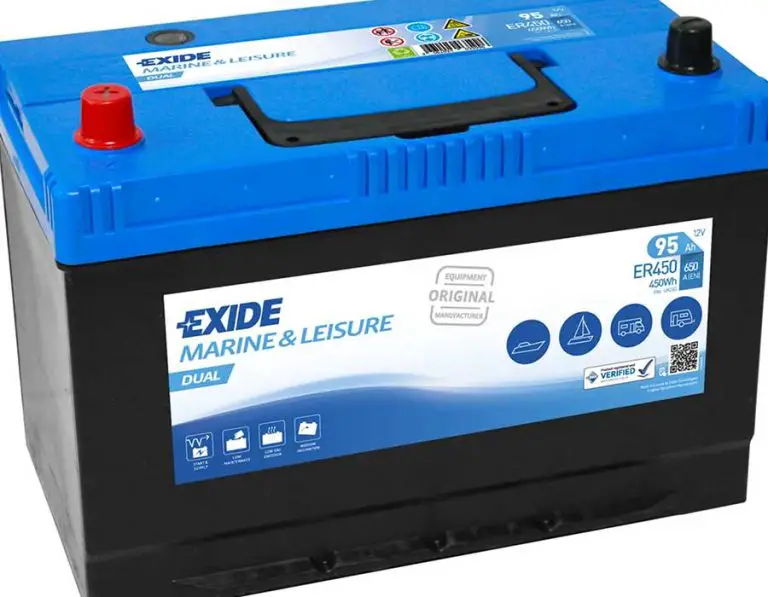How Much Does a Marine Battery Weigh?
Because a boat’s weight significantly impacts its performance and passenger safety, it is crucial to understand all factors adding to it.
Besides, modern boats must have a coast guard sticker with the passenger rating and the maximum weight. A coastguard can ticket you for crossing the weight limit, and you’ll have to return to the shore.
To avoid such unpleasant instances, individuals ask about their marine battery’s weight and how much it contributes to the overall boat weight.
Telling a marine battery weight isn’t straightforward because it differs per the battery type.
However, we’ve compiled the weight list of popular battery types below.
Different Types of Marine Batteries
Marine batteries differ in their functionalities and the purpose they serve. The three main types of batteries include the following.
Starter Marine Battery
Also called the cranking battery, this battery type starts the boat’s motor. They provide optimal power to the engine to start within a short time. However, they do not work to keep the motor on – that’s what deep cycle batteries do.
Deep Cycle
Deep cycle batteries feature thicker plates that allow them to give stable, consistent energy. They are excellent for powering the lights, fish finder, GPS, and the motor itself.
Dual Purpose Batteries
These batteries pack the properties of starter and deep cycle batteries and are known for their impeccable performance.
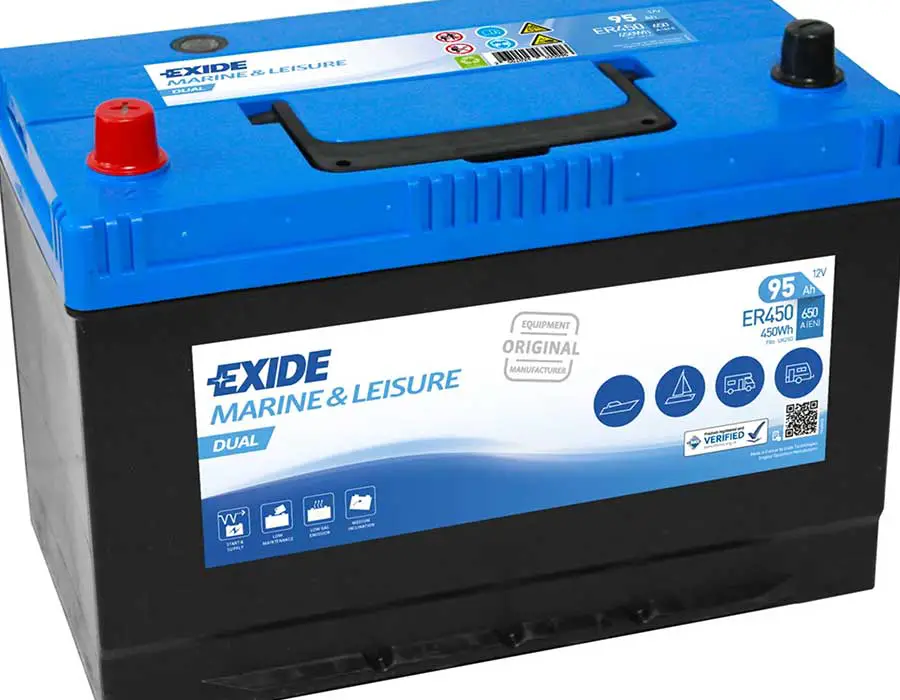
However, a few dual-purpose batteries do not provide enough power to start specific motors. Others, on the flip side, last longer than standard deep cycle batteries.
If you own a trolling motor, you’d need deep cycle and starter batteries for your boat to function efficiently. Yes, you might be intrigued to buy the dual ones to save cash and space. But that’s an option to consider if you go for a battery with lithium chemistry.
Speaking of chemistry, did you know that batteries can also be divided per the chemistry type?
Popular Marine Battery Chemistries
Different marine batteries do not contain the same materials. That said, a few include quality materials while others feature cheaper ones.
Affordable batteries might save you upfront costs, but you might need to pay more down the line. Of course, a battery with a weak in-built will deplete soon, and you’d need to buy more – again.
A quality battery, on the other hand, has an extended lifespan and maintains your device’s functionality – your marine motor, in this case.
So, quality batteries are costly, but they last longer and provide optimal functionality.
Lithium-Ion Batteries
These batteries contain lithium iron phosphate. They are typically small and lightweight. Besides, they charge the motor quickly and last longer, which is a plus.
Pros believe that using ionic lithium batteries eliminates 70% of battery weight from the boat. Further, it makes up for a safer battery keeping you from annoying battery leaks.
Low maintenance is another perk of owning these batteries. You do not need to do much for the upkeep and can spend that time fishing.
What’s more, they are equipped with Bluetooth, allowing you to see the charging status on your smartphone.
Lead Acid Batteries
The primary components of these marine batteries are lead and acid. Experts typically use flooded lead-acid batteries containing sulphuric acid and distilled water mixture. However, it requires them to add water frequently.
The only downside is their weight. Lead-acid batteries weigh far more than lithium batteries. In fact, they are bulky – not the kind of batteries you’ll prefer for your boat.
Further, you might need 2-3 batteries for optimal power that does nothing but adding more to the weight.
Gel and AGM batteries are two popular lead-acid battery types. They do not leak and have less self-discharge.
All in all, the disadvantages of these batteries outweigh the advantages. So, why would anyone consider these for their boat? Because their price tag is substantially less.
How Much Do Marine Batteries Weigh?
As stated earlier, the weight of marine batteries differs per the battery chemistry and type. Therefore, we’ll discuss the weight of popular marine batteries individually.
AGM Batteries
On average, a 100 Ah AGM battery typically weighs 65.97 IBS or 29.88 KG. The higher the Ah capacity, the bulker the battery.
So, the amp-hours automatically increase the size of deep cycle batteries.
Lithium-Ion Deep Cycle Batteries
Lithium-ion batteries weigh 75% less than lead-acid batteries. So, the lighter lithium-ion batteries do not put much weight on your boat, boosting its performance.
Antigravity Batteries do not weigh more than 26 IBS. However, they give 30-40% more power than lead-acid batteries of the same Ah capacity.
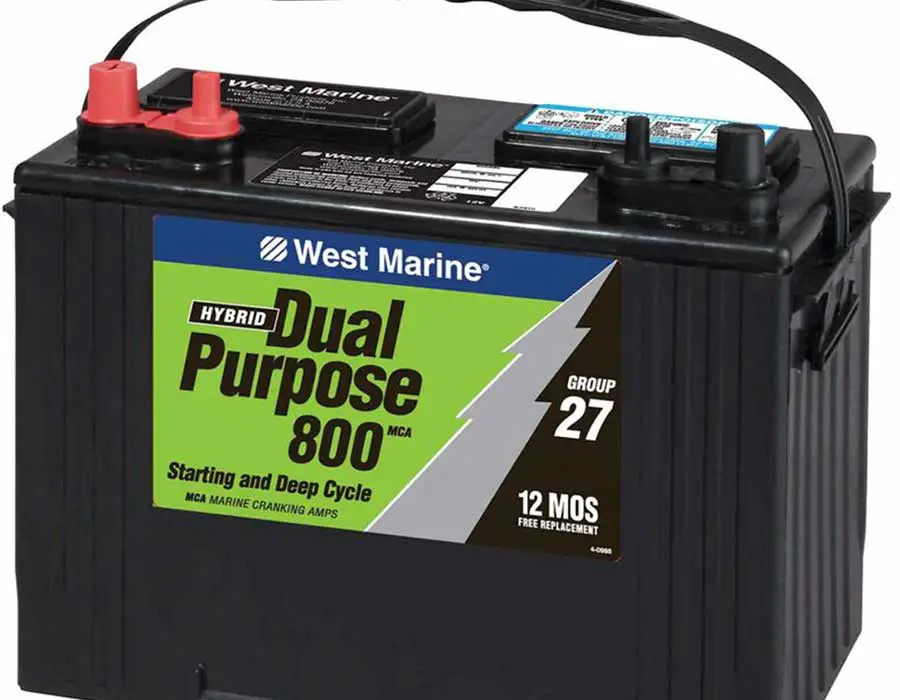
Group 27, 21 & 31 Battery Weight
Note that these groups indicate the battery dimensions. Therefore, these batteries can be lead acid, LiPo, or AGM batteries.
Group 27
Group 27 is an ideal fit for high-power trolling motors. They typically weigh between 60-75 pounds.
But again, the lithium-ion ones weigh considerably less in group 27. They are around 9 inches in weight, 12-13 inches in length, and almost 7 inches in width.
Further, these batteries have around 65-110 Amp-hour rating. Some provide up to 24 volts, while others are 12-volt batteries.
You can connect several of these to boost the voltage.
Group 24
The average weight of group 24 batteries is 40-50 pounds. Their height is around 10 inches, width is 6-7 inches, and length equals 11-12 inches.
The Amp-hour rating stands between 70-85. A few, however, have a whopping 100 Ah rating.
Group 24 batteries are typically rechargeable 12V batteries. Besides, pros often connect them in series to increase the voltage.
Group 31
Group 31 batteries are the most popular battery types for small and medium-sized marine motors. They typically weigh around 60-72 pounds.
The dimensions range between 9-10 inches, 6-7 inches, and 12-13 inches for height, width, and length, respectively.
These batteries outshine the other two groups in terms of amp-hour rating. They provide around 95-125 Ah rating, enhancing the motor’s power.
Lastly, group 31 batteries are available in 24V and 12V – you can pick per your preferences.
What Factors Affect a Marine Battery’s Weight?
Because a few batteries weigh more than others, you’ll naturally wonder what factors contribute to a battery’s weight. Some common reasons adding to a battery’s weight include:
- The battery type
- Size
- The number of cells in each battery pack
You can always check a battery’s weight before purchasing it. This would require you to take a quick look at the battery specifications. This will help you buy the correct battery for your boat.
Why Do Batteries Differ In Weight?
The primary reason for different battery weights is the amount of electrolyte and lead.
Marine batteries feature lead plates, also referred to as electrodes. The amount of lead varies significantly per the battery’s quality and the ampere-hours.
Likewise, lead-acid batteries have free-flowing water and liquid acid. Gel batteries have electrolytes in gel form, whereas AGM batteries have them in fiberglass mats within the lead plates.
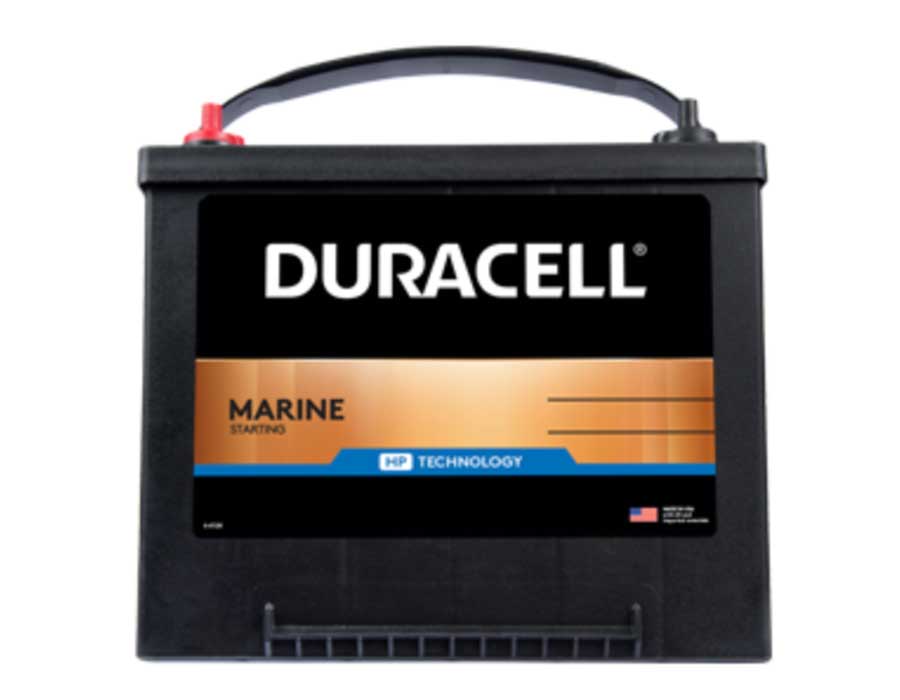
Does Using a Lighter Battery & Motor Make Any Difference?
A lighter battery and motor certainly make a difference by boosting your boat’s efficiency. But that isn’t the only pro. A lightweight motor and battery also provide more space in the vehicle.
Consequently, you can adjust more people and supplies without worrying about the room.
Contrarily, heavy motors and batteries take up too much space and add to the boat’s weight, risking your life and compromising the boat’s performance.
Experts recommend choosing small motors and lighter batteries. Not only are they easy to install, but they are also low maintenance.
Is Charged Battery Heavier Than an Uncharged One?
There’s a lot of confusion on the internet surrounding this question. A few individuals believe that discharged batteries weigh less than charged ones. However, no research proves it to be true.
The thing is, the number of electrons in the battery does not change when the battery depletes. So because the number of electrons makes a difference to a battery’s weight, a discharged battery doesn’t weigh less than a charged one.
Even if it does, the difference would be almost undetectable.
Why Does a Battery Weight Matter Anyway?
A heavy battery adds to the boat’s weight, and the weight of the boat affects its speed and buoyancy. Besides, more weight also leads to overweight issues, risking the passenger’s safety.
Additionally, you can get penalized for carrying weight more than the recommended amount.
A lighter battery, on the flip side, reduces the overall boat weight. Besides, it takes less space in the boat. Consequently, you can equip more people in one boat, improving its efficiency.
Experts also suggest using a lightweight battery. Yes, a quality lightweight battery requires you to pay more, but it outweighs a cheaper battery in terms of functionality and efficiency.
Closing Notes
Your boat’s weight affects various aspects of your journey, from your safety to the boat’s performance.
Therefore, maintaining the recommended boat weight is crucial. While you cannot reduce the boat’s weight by excluding essential boat features. What you can do, however, is purchase a lightweight battery.
We discussed several marine battery types, their weight, and their dimensions. You can pick the right one for your boat to upgrade its performance.

